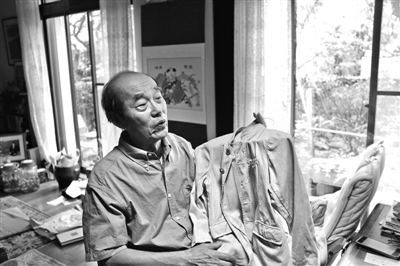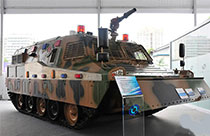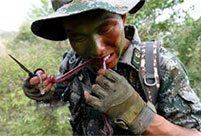

 |
| Nakajima still keeps the clothes his foster mother made for him. (People's Daily/Tian Hong) |
Nakajima Yohachi, Laifu, Chen Qinghe, Li Chenlin, Zhao Chenlin, five of these names have composed an unusual life — a story about a Japanese war orphan and his Chinese foster parents. Recently, the 73-year-old war orphan Nakajima Yuhachi published a memoir at his own expense. Nakajima says the book is not only to show his gratitude for China, but also to have more Japanese review the history and learn about the kindness of Chinese people.
The militarist Japan left behind thousands of children in China after its defeat in World War II in 1945. The Japanese children were adopted and raised by large-minded Chinese people. They later returned home to Japan with the help of the Chinese government and the people.
Nakajima was one of them.
Nakajima was born in Tokyo, at the age of 1, his parents took him and his sister came to Heilongjiang, China as members of a pioneer group. The family lost touch with his father after he joined the army in 1945. With Japan's defeat in World War II, Nakajima's family all became refugees. His birth mother entrusted him to a Chinese vendor Laowang. Laowang went door-to-door to find Nakajima a new family. A peasant woman Sun Zhenqin agreed to take him even though she knew Nakajima was a Japanese descendant. She called Nakajima "Laifu" at home and treated him like her own son, so did her husband Chen Yugui. Nakajima had his first Chinese name Chen Qinghe.
When Nakajima was 8, Chen passed away, and Sun got remarried. Nakajima's second father was Li Xiwen. Nakajima changed his name to "Li Chenlin." When Nakajiama turned 12, he had serious dropsy. His foster father took him everywhere with a cattle cart in order to cure him.
Nakajima's third father was Zhao Shusen. But this time, Nakajima's foster mother Sun "remarried" again for him to get an urban registered permanent residence, later Nakajima learned that his foster mother just wanted him to have a better future with more opportunities.
In June 1958, 16-year-old Nakajima took his teacher's advice and went back to Japan. Ever since then, he lost touch with his foster mother.
Nakajima worked very hard after he went back to Tokyo. He started with a job at Japan-China Friendship Association, and then became an interpreter until his retirement. "Japan is my motherland, but China is my real hometown," said Nakajima.
After his retirement, Nakajima finished his memoirs in two years, but no publisher was confident enough about his work. Nakajima spent over 1 million yen himself to publish his book. Because he did not have channels to sell the book, he went to the nearest bookstore to sell. The owner only agreed to take one book to see how it would work. Unexpectedly, he called Nakajima the next day and told him he finished the book and was really touched. Not only did he agree to sell the book, he even promoted the book to other bookstores.
Many of his readers wrote to Nakajima and told him that they had a new understanding about Chinese people through his book, and how moved they were. Now the first edition of the book had been sold out, and the second edition will print 1,000 more copies. The Chinese version of the book will be published in July.
This article is edited and translated from 《“中国才是我的家乡”》,source: People's Daily, author: Tian Hong
 China-made special vehicles in exhibition
China-made special vehicles in exhibition Soldiers serving at Liaoning aircraft carrier
Soldiers serving at Liaoning aircraft carrier Bikini beauties lifeguards in river rafting place
Bikini beauties lifeguards in river rafting place PLA soldiers eat raw snake meat in harsh training
PLA soldiers eat raw snake meat in harsh training Kiss contest held in Nanning, SW China
Kiss contest held in Nanning, SW China Yunnan-Myanmar Road: The past and present
Yunnan-Myanmar Road: The past and present Photos of beautiful policewoman become online hit
Photos of beautiful policewoman become online hit Campus belle of Xiamen University gets popular online
Campus belle of Xiamen University gets popular online Eight fruits that defend men's health
Eight fruits that defend men's health  Did the "Spartan" publicity stunt cross the line?
Did the "Spartan" publicity stunt cross the line? Sydney police that let mob attack consulate failed to do their duty
Sydney police that let mob attack consulate failed to do their duty 'Model fisherman' reel in tourist yuan in Guilin
'Model fisherman' reel in tourist yuan in Guilin Shady Chinese contraceptives also found exported abroad
Shady Chinese contraceptives also found exported abroadDay|Week